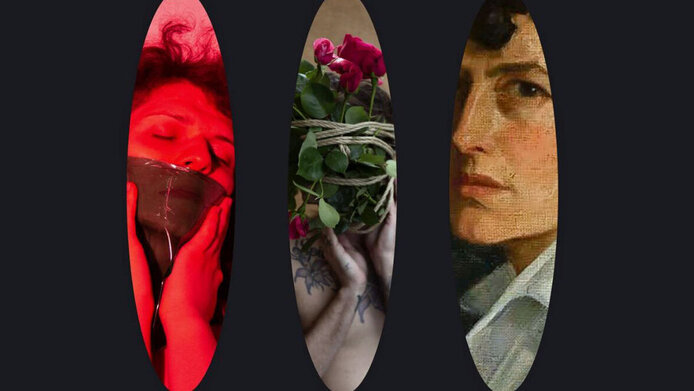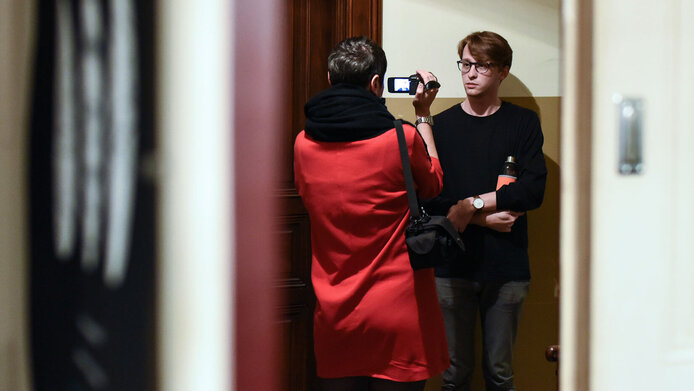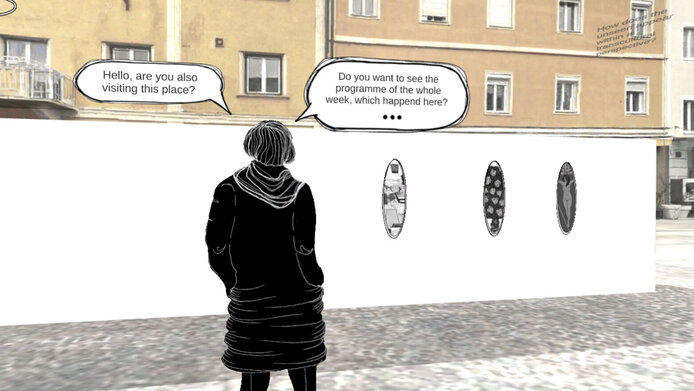Revealing what is avoided by society

An artistic intervention at commercial premises in Zagreb, Croatia, in 2019. One of the installations shown here addresses the loss of virginity in an attempt to capture two contrasting standpoints: a romantic, playful perspective that many people adopt when dealing with the subject, and a much less soft-focused angle, a harsh and rough reality of early sexual experiences. In another exhibition space, ropes predominate. They are wound around bodies to bring together different sides of a psyche, of an identity, to restore and heal the mind. A third art event addresses the difficulties LGBTIQ people encounter in their working environment. It is a stage play tackling discrimination and its consequences that is also designed for performances in firms so as to raise awareness.
In addition to lectures, interviews, workshops and film screenings, these three contributions were on display at the intervention on the LGBTIQ issue that took place in the Croatian capital as part of the “Mapping the Unseen” project supported in the context of the FWF's PEEK programme. Initiated by the performing artist and psychologist Katrin Ackerl Konstantin, the activities are based on the principles of art-based research. They are intended to explore topics that are considered taboo in various societies and not addressed in public. The venues of these “analog mappings”, which is the term used by the project to describe this exploration of discursive blind spots by local artists, scientists, NGOs and an interested community, are spread throughout the globe. In Croatia, the focus was on LGBTIQ issues; in Bangladesh it was on the treatment of refugees belonging to the Rohingya ethnic group, who were forced to flee in large numbers from Myanmar. In Iran the project addressed discrimination and creative freedom under the aggravating circumstances of a totalitarian regime.
Spaces where social orders can be explored and challenged
The starting point for the reflection were the Austrian cities of Klagenfurt and Villach. “Three individuals who live or lived in Carinthia and had migrated to Austria from these three countries became our guides to the taboo subjects – both in Austria and in their countries of origin,” explains Ackerl Konstantin. In the cities where the events took place, artists, art groups, NGOs, associations or institutions were invited to shed light on these hidden topics and contribute their perspective. “This mapping practice can be thought of as a form of artistic cartography that analyses marginalised topics, which are considered as unused social spaces, and gives them visibility,” explains Ackerl Konstantin.
In addition to exploring “discursive gaps”, the team looked for real-life vacant spaces in the respective countries – such as business premises or offices – that could be filled with art-based research activities. Ackerl Konstantin used the format of so-called showrooms, which she herself helped to develop, for this purpose. “This is about conducting performances away from theatre spaces in order to reach a wider audience and not only those interested in the arts. These performative and participatory interventions become part of an interdisciplinary approach which aims at making marginalised issues visible,” says Ackerl Konstantin. “The spaces become enabling spaces for challenging social orders.” In Zagreb, a commercial site was filled with activities in this context. It was only in Tehran that the participants had to make do with private spaces to avoid possible reprisals by the authoritarian regime.
After the activities in Iran, Bangladesh and Croatia, the theme was also addressed in Austria in suitable vacant spaces. The artists and cooperation partners were invited to show their work once more. In addition, there were regional contributions from academics, artists and associations who are also currently working on the selected theme. The aim was to explore the topics from an intercultural and transcultural perspective. Ackerl Konstantin and her research team use a range of methods: autoethnography, interviews, workshops, participant observation and in-depth hermeneutic analysis.
From analog to virtual mapping
Art-based research combines and explores approaches from art and the theory of science and uses individual sensory experience in experimental settings as a means of cognition. In the current project this helps to explore and create alternative means of investigating power structures and other social mechanisms that contribute to the tabooing of social realities. An integral part of “Mapping the Unseen” was making the findings of this research activity accessible adequately and sustainably. The on-site analog mapping performances were followed by the construction of a digital experiential space that makes the results of the mapping work available through “virtual mapping”.
Film footage, images and materials on the interventions can be accessed at this online site of reflection. “It is not just an archive for clicking through,” notes Ackerl Konstantin. “The virtual spaces only come into their own through the interaction with the visitors. The visitors are involved in creating the visualisation on the website. In this way, the team also intends to illustrate the idea of the philosopher Maurice Merleau-Ponty, according to which the viewers themselves are always involved in the process of perception. Only through this confrontation do things become visible.”
Personal details
Katrin Ackerl Konstantin is an actress, director and cultural psychologist. Her work focuses on participatory performing arts from a queer-feminist perspective. She studied acting at the Vienna Conservatory of Music and Performing Arts and psychology at the University of Vienna and the Alpen-Adria-Universität Klagenfurt. Since 1995 she has been working internationally as an actress, director and artistic director at national and municipal theatres as well as small and medium-sized theatres. Since 2011 she has been publishing and teaching on the topics of participation-performativity-performance. Her project “Mapping the Unseen” received EUR 251,000 in funding under the Programme for the Development and Exploitation of the Arts (PEEK) of the Austrian Science Fund FWF.
Publications and exhibitions
Ackerl Konstantin K. (ed.) The virtual mapping of Mapping the Unseen, Zenodo 2021: https://virtual.mappingtheunseen.com/
Ackerl Konstantin K., Kopeinig R.: Mapping the Unseen, in: Queer STS Forum. Queer interventions, Vol. 6, 2021 (PDF)
Ackerl Konstantin K.: „Mapping the Unseen“, Exhibition at the Museum am Bach. „Intopia. Welt ohne Lügen. Recherchen zu sozialen Modellen der Moderne. Sammlungsschau“, 21.8.–31.10.2021
Ackerl Konstantin K.: „The virtual mapping of Mapping the Unseen“, Austrian part of the digital exhibition by Creative Europe Free to Create, Create to be Free, 2022







